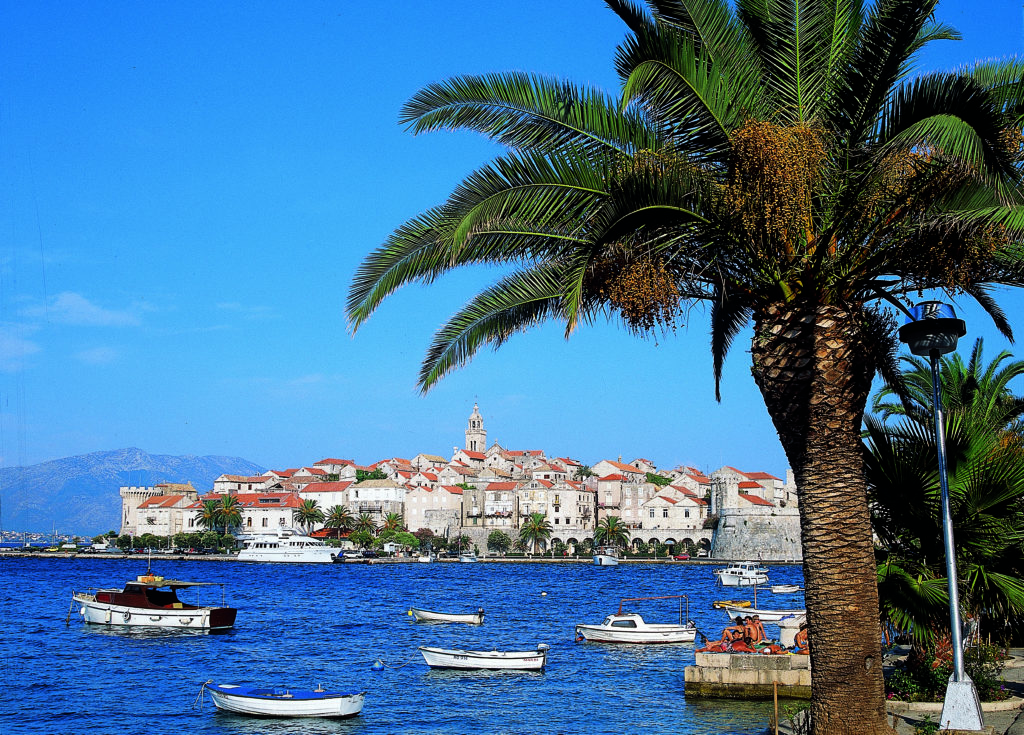“That’s the thing about books. They let you travel without moving your feet.”
—Jhumpa Lahiri, The Namesake
While much of the world continues to shelter in place, what better way to broaden our minds and find solace than through literature? Some of our esteemed Cal Discoveries Travel Tour Lecturers have shared their all-time favorite travel reading selections. Check out their recommendations below.
What’s your favorite book to read while traveling? Drop us a line at caldiscoveries@alumni.berkeley.edu and let us know!
Lecturer: Joe Lurie
Book: A Geography of Time: The Temporal Misadventures of a Social Psychologist
Author: Robert V. Levine
Why: With author Robert Levine we travel to Brazil, where to be three hours late is perfectly acceptable, and to Japan, where he finds a sense of the long-term that is unheard of in the West; and across the globe where we discover that the words “soon” and “late” can have very different meanings. To travel is to see with new eyes and discover how different cultures may keep time in astonishingly different ways.
Lecturer: Marissa Moss
Book: The Innocents Abroad
Author: Mark Twain
Why: It’s absolutely hilarious, and we need humor now more than ever. Mark Twain joins a group tour through Europe and the Holy Land and playfully skewers Americans’ perceptions and prejudices (the “innocents”) in his usual lively manner. He’s just the kind of fellow traveler you’d want on your next adventure.
Lecturer: Professor Tim Duane
Book: Blue Highways
Author: William Least Heat-Moon
Why: Blue Highways guided me on a three-month, 10,000-mile journey throughout western North America the summer after I finished college. It captures the wisdom of how much one can learn from the out-of-the-way places on the “blue highways” off the interstate. That wisdom has never failed me as I’ve traveled in search of a true understanding of a place and its people.
Lecturer: Professor Ian Duncan
Book: Recollections of a Tour Made in Scotland, A.D. 1803
Author: Dorothy Wordsworth
Why: In 1803 Dorothy Wordsworth accompanied her brother, the poet William, and their close friend (and fellow-poet) Samuel Taylor Coleridge on a summer tour through southwest Scotland to Loch Lomond and the Highlands. They went on foot, accompanied by an Irish “jaunting car” (a small carriage seating two persons). Coleridge was in poor health and worse spirits, and eventually left the party. Dorothy keeps up her intense curiosity about the people they meet, in a region still untouched by tourism, as well as a refined appreciation for the beauties of landscape. We read about the origins of some of her brother’s most famous and haunting poems (“Stepping Westward,” “The Solitary Reaper”). Dorothy’s own prose is poetic in the best sense—low-key, subtle, exquisitely attuned to personal encounters and local atmospheres.
Lecturer: Rada Brooks
Book: The Agony and the Ecstacy
Author: Irving Stone
Why: Passages from the book still resonate with me when I visit Italy. I highly recommend this novel to anyone visiting Italy as you will get a better understanding of Michelangelo, the genius behind many of the world’s best art masterpieces.
Lecturer: Professor Noah Whiteman
Book: The Voyage of the Beagle
Author: Charles Darwin
Why: Because it plants the seed for all of his later ideas, which may well be the most important idea humans have ever distilled.
Lecturer: Bill Tramposch
Book: The Prelude
Author: William Wordsworth
Why: I was never without Wordsworth’s The Prelude in hand when we traveled the Lake District. It is an extended autobiographical poem capturing the major chapters in his life; and there is much within it that I suggest as a travel companion when visiting his special corner of the world.
Lecturer: Josef Chytry
Book: Culture and Society in Seventeenth-Century France (1970)
Author: David Maland
Why: For my France tours especially in relation to “classical” French culture For those fascinated by classical seventeenth-century French culture, Maland’s careful overview provides a brilliant and concise summary of its major achievements. From the foundations of a centralizing state by Louis XIII in the early seventeenth century to the creation of Louis XIV’s reign in Versailles, Maland’s study covers all the main cultural figures and their unique contributions to a distinctly “classical” mode of civilization which exercised such a massive influence over the rest of Europe in the eighteenth century. Visitors to France will especially benefit from understanding much of the roots of modern French culture that goes back to this classical period.
Book: Fin-de-Siecle Vienna: Politics and Culture
Author: Carl E. Schorske
Why: For Central Europe/Habsburg/Vienna tours Carl Schorske’s remarkable study of Fin-de-Siecle Vienna won a Pulitzer Prize in history for its carefully articulated and brilliantly researched understanding of some of the roots of European modernism that emerged from a Viennese culture caught between efforts at an Austrian liberalism and the rise of anti-liberal politicians who later exercised a major influence on the Austrian Adolf Hitler. In a series of penchant studies of significant Viennese culture-makers, Schorske works his way from architects and musicians to writers and artists before closing with brilliant studies of Freud and Schoenberg. A must for all visitors to Austria and Vienna who wish to understand some of the reasons for its apogee–and fall.
Lecturer: Professor Terry Johnson
Book: A Walk in the Woods: Rediscovering America on the Appalachian Trail
Author: Bill Bryson
Why: Bryson manages to weave his personal and immediate experience on the trail with its history. The age and grandeur of the trail and the small foibles of those who walk it gently share its pages.
Book: Last Chance to See
Authors: Douglas Adams and Mark Carwardine
Why: Adams travels the world to see species on the edge of extinction, and asks those who study them what drove them to it. This might be the funniest book about endings ever written, and one of the saddest, too.
Lecturer: Professor Emerita Paula Fass
Book: Venice Observed
Author: Mary McCarthy
Why: One of the most talented twentieth century American literary figures, brings the readers into unexpected sides and sites of Venice that McCarthy recognizes as the original and by now tediously explored tourist venue. In introducing the vanishing inhabitants (including the lace workers and glass blowers), she allows us to see Venice in a fresh way and in language that creates a new appreciation of this precious and possibly vanishing place.
Book: Romola
Author: George Eliot
Why: The great (possibly greatest) of British nineteenth century novelists, is a historical novel set in Renaissance Florence. It brings the readers into the lives of people who are both high and low in the society and vividly describes streets and buildings which the visitor can still recognize and appreciate. While not a guidebook, it is an intimate description of Florence at the time it was forming as a unique place.
Lecturer: Hans Giesecke
Book: A Time of Gifts
Author: Patrick Leigh Fermor
Why: By far my most favorite travel book (or set of books in this case) is the trilogy written by legendary British travel writer Patrick Leigh Fermor. The first book of this trilogy is A Time of Gifts, the second is Between the Woods and the Water, and third is The Broken Road. All three of these travel journals are great, but the first one is the best.
Lecturer: Dr. Larry Michalak
Book: Richard Halliburton’s Complete Book of Marvels
Author: Richard Halliburton
Why: When I was a boy the book which gave me an appetite for travel was Richard Halliburton’s Complete Book of Marvels, published in 1941. Halliburton was an adventurer who traveled around the world in the 1920s and 1930s. He wrote books mainly for young people in gushy, breathless prose, but he is a great story-teller and fun for adults too. He wrote about ten books, all of them long out of print but widely available used.
Lecturer: Brent Mishler
Book: Noa Noa: The Tahitian Journal
Author: Paul Gauguin
Why: The most widely known of Gauguin’s writings; insights into his thinking and motives based on his time spent in Tahiti. The 1985 Dover reprint is available and inexpensive, and has 24 of his drawings reproduced.
Book: Aphrodite’s Island
Author: Anne Salmond
Why: Detailed mixture of scholarly and popular history describing the European discovery of Tahiti and cultural reactions on both sides.
Book: On the Road of the Winds
Author: Patrick V. Kirch
Why: A scholarly but quite readable synthesis of Polynesian history across the Pacific Islands, by a former professor in the UC Berkeley Moorea class! Professor Kirch is both an archaeologist and a paleo-ecologist and integrates the effects of people on the environment and vice-versa.
Lecturer: Dr. Vernard Lewis
Book: The Sagas of Icelanders
Author: Jane Smiley
Why: A new translation (original writing 1,000 years old) and large tome (700 pages) that showcases Norse history for Iceland. Kind of reminds me of the Iliad and Odyssey or the Bible: but this time for Vikings. A bit long and over grandiose at times, but still a good cultural representation of the last European land settled. Reading this helped me better understand Iceland’s geography, people, and culture during my Iceland 2019 trip. Also explained why Odin wears an eyepatch in the Hollywood movie versions.
Book: Islam
Author: Karen Armstrong
Why: I have travelled to three different Muslim countries including Morocco in 2019. Growing up in America, I was taught very little about Islam and Muslims. This book gives a good big picture view of a faith and culture that includes almost two billion people. A must read for first time travellers to these wonderfully diverse and culturally rich countries.
Book: Louisiana Cowboys
Author: Bill Jones
Why: Many Americans have little understanding or appreciation of cattle ranching. This book features cattle ranching on open prairies in Southwestern Louisiana. Yeah, cattle ranching in swamps. Better yet, it features a chapter on Black cowboys, one of them is actually my uncle! A great read, albeit sometimes graphic, and features a little known factoid of diversity least expected in America.
Book: The Tangled Tree: A Radical New History of Life
Author: David Quammen
Why: A good book to read that outlines the history leading to the discovery of DNA and contributions of many scientists, including men and women. The book also includes more recent discoveries: some are thought provoking and suggest that humans are not at the top of the tree of life–but more like a cornucopia of life forms that collectively contribute to the human experience.
Lecturer: Colonel John Chere
Book: A Peace to End All Peace
Author: David Fromkin
Why: In A Peace to End All Peace David Fromkin lays out one of the classics on the post WWI period of 1914-1922 and how and why The Allies drew arbitrary lines on the map that would shape the geography and politics to many of the challenges the Modern Middle East faces today. While many are quick to cast judgement on why the Middle East is locked in time and facing overwhelming hurdles, few know the background to the tumultuous birth of nation states in that region combined with the impact of coming out of several hundred years of decentralized rule under the Ottomans.
Book: Power, Faith, and Fantasy: America in the Middle East: 1776 to the Present
Author: Michael Oren
Why: Power, Faith, and Fantasy tells a fascinating story of America’s 230+ year relationship with the region we call the Middle East. It is extremely well written and narrated by Michael Oren, a diplomat, scholar, soldier, and war correspondent who draws from his vast experience, research, documents and personal relationships to weave a powerful story about how and why the United States reluctantly tied itself to a turbulent and complex region. For the Middle East war buffs, Oren also produced one of the best accounts of the Arab-Israeli 1967 war.
Book: Orientalism
Author: Edward Said
Why: Orientalism is a familiar, yet controversial and complex read on any University course book list on the Middle East region. Written in 1978 by Said, a Palestinian-American, it tells the story of how life in the “East” (North Africa, the Middle East and Asia) is viewed through the lens of a patronizing, imperialist “West”. While an important read, this is also a somewhat long and scholarly analysis for the serious readers at heart, and certainly not without bias.
Book: The Lemon Tree
Author: Sandy Tolan
Why: In a lighter but equally well written read told in a story of hope, Sandy Tolan tells the story of a Jewish and Palestinian family and their story of being united in humanity, but continuously separated by the political realities of what is happening as the modern State of Israel and the occupation/settlements evolve around them. A great read that portrays hope and light to a difficult and equally controversial problem, but written in 1998 it is further overshadowed by the realities that have occured since then.
Lecturer: Professor Vince Resh
Book: Paradise
Author: Larry McMurtry
Why: Given the choice of picking only one travel book, I decided that the best criteria would be a book that I read over and over again. The author, Larry McMurtry, is a Pulitzer Prize-winner famous for his novels like Lonesome Dove, The Last Picture Show, and Terms of Endearment. While experiencing turbulent times in his life, he decides to book a cruise to Tahiti and the isles of French Polynesia. The resulting 2002 book Paradise is a recount of that cruise, his interactions with other passengers, the meeting and non-meeting of travel expectations, and a memoir about no matter how far away you get from home (the harsh landscape of East Texas for him), those memories color perceptions of where you are headed.
 Lecturer: Professor Sheldon Rothblatt
Lecturer: Professor Sheldon Rothblatt
Book: A Sentimental Journey
Author: Laurence Sterne
Why: An 18th-century proto-romantic whimsical novel about Sterne’s travels in France, “sentimental” because it is more about people than places. An older generation will know the popular song by Les Brown and Ben Homer called “Gonna Take a Sentimental Journey,” the title of which derives from Sterne.
 Lecturer: Jack Dold
Lecturer: Jack Dold
As for travel writers my all-time favorite will always be Mark Twain but he isn’t usually thought of as a travel writer. A Tramp Abroad, Following the Equator, Roughing It, Life on the Mississippi, Innocents Abroad—all of them are great travel stories. I just published a book on Mark Twain based on Cal Alumni tours. But for modern writers I love Tim Cahill. He writes about very unusual trips and his titles reflect that—Pecked to Death by Ducks, Lost in my Own Backyard, etc. Like Mark Twain, he is very funny.
Learn more about our Tour Lecturers and browse their upcoming trips.




















